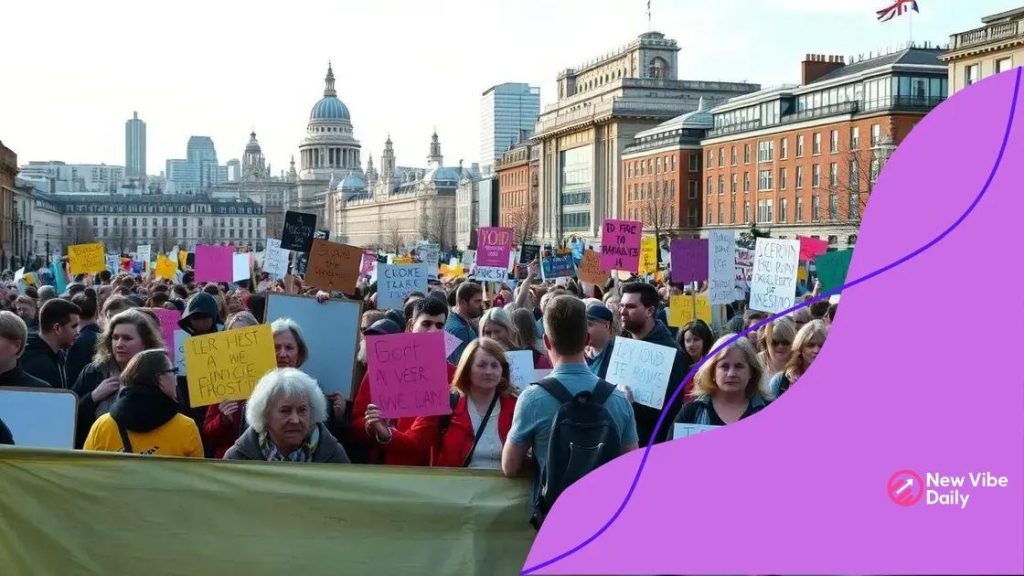Protest laws under review uk: what you need to know

Protest laws under review in the UK are proposed changes that may impact civil liberties, emphasizing the need for public engagement and advocacy to ensure that freedom of expression is protected.
Protest laws under review uk have sparked significant discussions across the nation. As the legal landscape evolves, it’s essential to understand what this review means for our rights and freedoms. What are the implications for citizens eager to express their views?
Understanding the current protest laws in the UK
Understanding the current protest laws in the UK is crucial for everyone who wants to participate in demonstrations or public gatherings. These laws dictate how individuals can express their views peacefully and legally. It is important to know what is allowed and what could lead to legal issues.
Overview of Key Laws
The UK has several laws that govern protests, making it essential for demonstrators to be informed. Public Order Act 1986 is one of the primary legislations regulating protests. This act outlines the conditions under which law enforcement can intervene during public demonstrations.
Important Aspects of the Laws
Some critical aspects of the current protest laws include:
- Permission Requirements: In many cases, organizers must notify local authorities about planned protests.
- Obstruction of Public Highways: Blocking roads can result in legal action against protesters.
- Time and Place Restrictions: Authorities can set limits on when and where protests can take place.
It’s essential to understand the legal implications before participating in a protest. Violating these laws can lead to arrest or fines, making it imperative for individuals to be informed of their rights and responsibilities.
Moreover, activists often debate whether these laws hinder or protect civil liberties. While some argue that strict regulations prevent public disorder, others feel they limit freedom of expression. It’s a fine balance that lawmakers strive to achieve.
Keeping updated on any changes to the current laws is essential as well. Reviews of these laws might introduce new regulations or amend existing ones, and being aware can empower citizens to advocate effectively.
Key changes proposed under the review
Key changes proposed under the review of protest laws in the UK could significantly alter how demonstrations are conducted. These potential amendments aim to clarify and adjust the legal framework governing public protests, influencing the rights of citizens to express their opinions.
Proposed Changes in Regulations
One major change focuses on the notification requirements. Currently, organizers often need to inform local authorities about a planned protest. The review could streamline this process, making it easier for groups to assemble peacefully.
Increased Authority for Police
Another proposed change is the enhanced powers granted to police during protests. The review suggests that law enforcement could have more authority to intervene when they believe public order is at risk. This could lead to quicker responses in cases of unrest.
These proposals spark debates about the balance between maintaining public safety and protecting freedom of expression. While some people argue for stricter regulations to prevent potential violence, others feel that these changes threaten the core of democratic rights.
- Revised time limits: Adjustments to how long protests can be held in certain areas may be proposed.
- Location restrictions: New laws might impose stricter limits on where protests can occur, affecting foot traffic and visibility.
- Potential penalties: Increased fines or penalties for organizers who do not comply with new regulations could be on the table.
As these changes are discussed, public opinion will play a vital role. Community feedback could influence lawmakers to reconsider specific provisions to ensure that rights are upheld.
Impacts of the proposed laws on civil liberties

The impacts of the proposed laws on civil liberties are a major concern for many within the UK. As these laws are reviewed, it’s important to understand how they could affect individuals’ rights to protest and express themselves.
Potential Restrictions on Freedoms
One of the main impacts may be increased restrictions on how and when people can demonstrate. These changes could lead to fewer opportunities for public expression and limit the voices of those demanding change.
The Right to Peaceful Assembly
The proposed laws could challenge the right to peaceful assembly, which is a fundamental aspect of democracy. If new regulations make it harder to gather publicly, this right could be severely undermined.
For activists and regular citizens alike, understanding these potential impacts is crucial. Changes in protest laws might mean that demonstrations could be subject to a higher level of scrutiny and restriction, leading to fears about being arrested or fined simply for expressing an opinion.
- Increased police presence: A greater police presence during protests could create an atmosphere of tension.
- Tighter regulations: Stricter rules on protest locations and times may arise, limiting public engagement.
- Fear of reprisal: Citizens might hesitate to protest due to fear of legal consequences.
These developments could ultimately deter individuals from participating in protests altogether, transforming the landscape of public discourse in the UK. As the review moves forward, it’s vital to monitor the proposed changes and their societal implications, ensuring that the essence of civil liberties remains protected.
Public opinion on the protest laws review
Public opinion on the protest laws review in the UK varies widely, reflecting diverse views on civil liberties and public order. As the review progresses, many citizens express concerns about how proposed changes might affect their ability to voice opinions.
Voices of Concern
Many groups advocate for the protection of freedom of expression. Activists, community leaders, and ordinary citizens worry that new restrictions could stifle their voices. Surveys indicate that a significant portion of the public believes that protests are necessary for democracy.
Support for Regulation
Conversely, some individuals support the review, arguing that tighter regulations are essential for maintaining public safety. They believe that unchecked protests can lead to disruptions and violence, calling for measures that ensure peace during public gatherings.
This divide shows how different experiences shape attitudes toward protest laws. Discussions through social media platforms show emotional and passionate responses from both sides. As these conversations unfold, it’s vital for lawmakers to hear and consider these diverse perspectives before implementing any changes.
- Social Media Reactions: Platforms like Twitter and Facebook host discussions that can rapidly spread opinions on proposed laws.
- Community Forums: Many communities hold forums where residents can voice their concerns or support regarding the review.
- Surveys and Polls: Regular polls track public sentiment, revealing shifts as new information emerges regarding the laws.
Understanding this public sentiment is vital. It highlights the importance of civic engagement in shaping laws that impact everyday life. As discussions continue, both sides will need to navigate the fine line between safety and freedom.
Next steps for advocacy and public involvement
The next steps for advocacy and public involvement in the context of the protest laws review are crucial for ensuring that citizens’ voices are heard. As discussions progress, individuals and organizations can play an active role in shaping the future of these laws.
Engaging with Lawmakers
One effective way to advocate for change is to engage directly with lawmakers. Citizens can reach out to their local representatives to express their concerns and suggestions regarding the proposed laws. This personal touch can help create a dialogue that influences decision-making.
Participating in Public Consultations
Public consultations offer a platform for individuals to share their thoughts on the review. These forums allow citizens to voice their opinions, making it essential for community members to participate actively. Attending these events provides a chance to connect with others who are concerned about the implications of the laws.
Advocacy groups and organizations can also organize campaigns to raise awareness about the importance of preserving civil liberties. By promoting educational efforts about the proposed changes, these groups can mobilize support and encourage public participation.
- Host Workshops: Advocacy organizations can hold workshops to educate the public on their rights and the proposed laws.
- Utilize Social Media: Online platforms can amplify voices, sharing information and mobilizing supporters quickly.
- Form Coalitions: Joining forces with other groups can strengthen advocacy efforts, showcasing a united front.
Staying informed about the legislative process is also important. This knowledge empowers citizens to act promptly as changes unfold. By being proactive, individuals can ensure their voices contribute meaningfully to the ongoing discussions about protest laws.
FAQ – Frequently Asked Questions about Protest Laws Review in the UK
What are the main concerns about the proposed protest laws?
Many are worried that the proposed laws could limit freedom of expression and the right to peaceful assembly.
How can the public get involved in the law review process?
The public can engage by attending community forums, reaching out to lawmakers, and participating in public consultations.
What role does public opinion play in shaping these laws?
Public opinion influences lawmakers by highlighting concerns and perspectives on how proposed changes may affect civil liberties.
Why is it important to stay informed about protest laws?
Staying informed helps citizens understand their rights and responsibilities, ensuring that they can advocate effectively for their interests.






